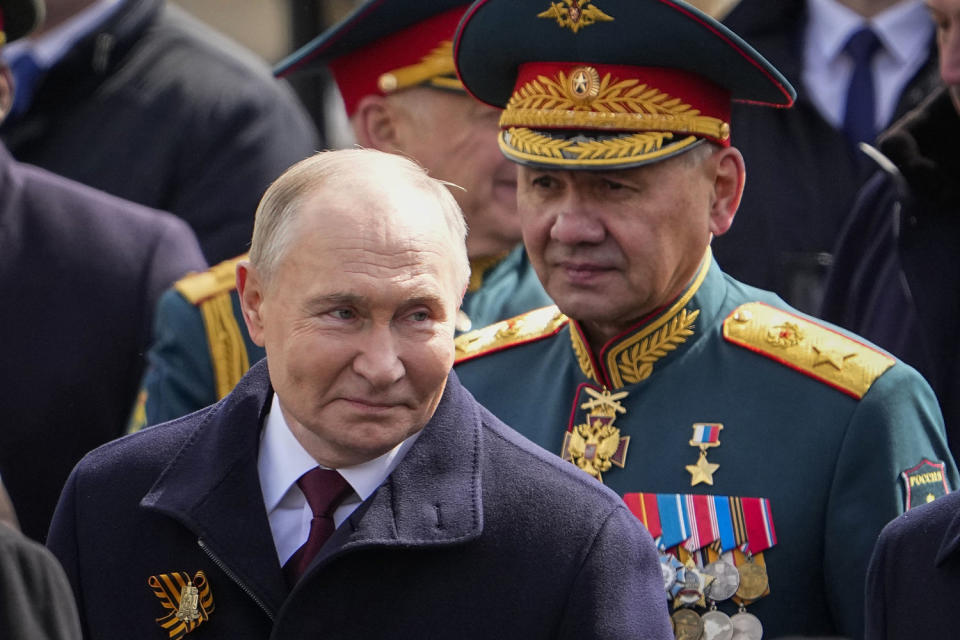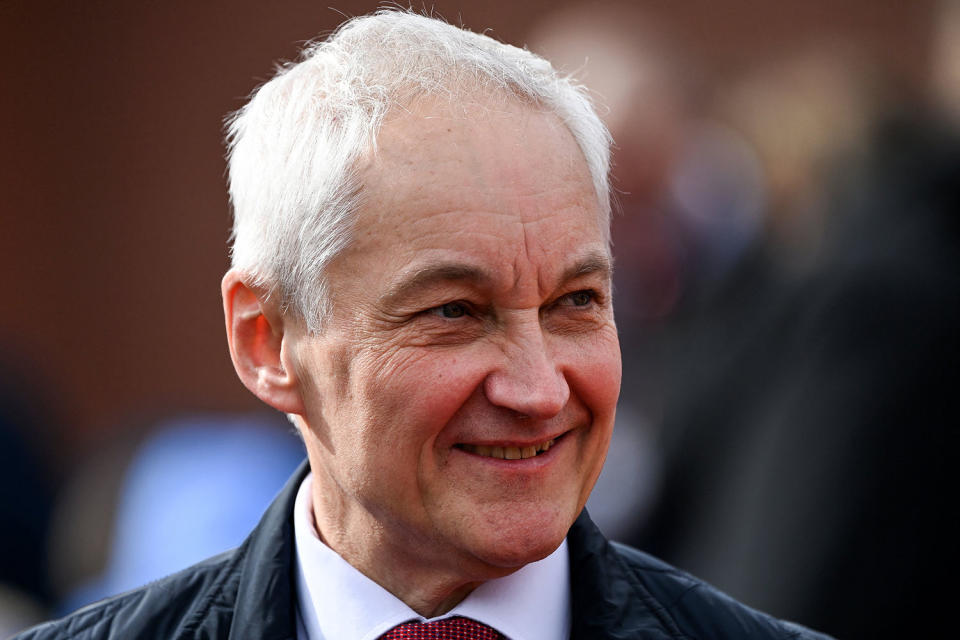Man leading Russia’s war in Ukraine is out in a surprise shake-up hinting at Putin’s focus
- Oops!Something went wrong.Please try again later.
- Oops!Something went wrong.Please try again later.
Sergei Shoigu seemed to have survived.
The man leading Vladimir Putin‘s war in Ukraine was looking relaxed just last week as he appeared in uniform at the Russian leader’s fifth inauguration ceremony and then at Moscow’s annual Victory Day parade.
But on Sunday he was removed as defense minister, the post he had held on to for more than a decade despite a rebel mutiny, a corruption scandal and a calamitous start to the full-scale invasion of Russia’s neighbor.
The most dramatic shake-up in Russia’s military leadership since the war in Ukraine started in February 2022, the move was made all the more surprising by the fact that Russian forces recently seized the initiative on the battlefield and launched a new offensive in the north after a number of gains in Ukraine’s east.

Shoigu, a close Putin confidant who was once one of the most popular politicians in Russia and deemed unsackable, has been the focus of criticism about how the war has been conducted.
Observers of the Kremlin said Monday that the decision to remove him — and replace him with a civilian economist — could betray Putin’s frustration with how the war has gone and his determination to ensure Russia is prepared for a long fight with Ukraine and its Western allies.
“It’s another indication that Putin is prepared to fight a long war in Ukraine and make the Russian economy sacrifice whatever may be necessary to do so,” Michael Clarke, visiting professor of war studies at King’s College London, told NBC News.
Gone fishing
Shoigu’s role and importance in the Ukraine fight so far is hard to underestimate.
A senior European intelligence official told NBC News last year that he was among a small number of officials central to planning the invasion of Ukraine, signifying the scale of the break that Putin is making with how the Kremlin has operated. Shoigu has long been one of Putin’s closest allies, with their friendship on public display as the two men took frequent fishing trips to Siberia.
Shoigu has not been dispensed with entirely, though. He has been appointed the secretary of Russia’s national security council, an important position but one that could serve as a comfortable retirement post for a trusted Putin ally. It goes along with the Russian leader’s habit of rarely firing people in his inner circle outright.
He replaces another prominent figure, Nikolai Patrushev. A former Federal Security Service director who has had Putin’s ear for years, Patrushev will be appointed to a new job that the Kremlin has not yet announced. He is an ardent war supporter known for his strong anti-Western views, and his son Dmitry — tipped by some as a possible “new generation” candidate for the top job — was promoted in the reshuffle.
After scathing criticism from late Wagner mercenary chief Yevgeny Prigozhin and Russia’s powerful military bloggers following a series of embarrassing military retreats in late 2022, Russia’s Defense Ministry has enjoyed success thwarting Ukraine’s vaunted counteroffensive last summer, and recent advances across the front lines as Ukraine awaits U.S. aid amid severe ammunition and manpower shortages.
But Shoigu’s fate has been a subject of rampant speculation since the disastrous start to the war and Prigozhin’s aborted attempt to topple him last year. That only intensified in recent weeks after the detention of one of his deputies and allies, Timur Ivanov, in one of the highest-profile corruption scandals Russia has seen in years.
The role change is Putin’s way of “taking Shoigu out of the game so as not to offend him, with maximum honors,” Tatiana Stanovaya, a senior fellow at the Carnegie Endowment for International Peace and the founder and head of the political analysis firm R.Politik, wrote on Telegram.
“Not because he is a friend, but because it is safer for Putin himself,” Stanovaya said.
Still, Shoigu’s presence at the helm of the national security council could also mean the presence of someone less hawkish in that role, and “at least one may hope that he would not argue for further escalation,” said Mark Galeotti, director of the London-based Mayak Intelligence consultancy.
“In any case, none of this signals a change in political direction,” Galeotti wrote in his analysis in The Spectator on Monday. “If anything, the opposite: as Putin digs in for the long term, with the ‘special military operation’ now being the central organising principle of his regime, he knows he needs technocrats to keep his war machine going.”
An economist running the war
Coming in to replace Shoigu is a figure established in the Kremlin’s circles but largely unfamiliar to wider audiences, especially in the West.
Andrei Belousov, 65, is a civilian economist who served as the first deputy prime minister in the government that was reshuffled after Putin’s inauguration last week. He has also served as Putin’s economic aide and minister of economic development in the past.

The Kremlin’s official framing of his appointment is that Russia is approaching a situation that the Soviet Union faced in the mid-1980s during the Cold War, when the military and law enforcement accounted for a 7.4% share of the economy.
That means it’s vital that wartime spending in today’s Russia is firmly integrated into the country’s economy, “such that it corresponds to the dynamics of the present moment,” Kremlin spokesman Dmitry Peskov told reporters Sunday, explaining Putin’s choice.
It makes sense, Galeotti wrote, because “the defence minister, especially in time of war, is essentially an administrator, there to ensure that the military has the men and materiel it needs,” which makes Belousov “an unexpected but logical choice.”
It could signal that Putin is formally preparing for a war that will drag on for many more years, analysts said.
His original plan, which the Kremlin still calls “a special military operation,” intended to capture Ukraine in weeks. But the war is now into its third year, and the Kremlin needs to fully militarize not just Russian society but also the country’s economy if it is to produce the equipment needed to keep fighting given the scale of Russian losses.
While Russia has significantly ramped up domestic military production, Western sanctions have forced it to turn to countries like China, North Korea and Iran for weapons supplies. But with the shake-up, Putin appears to be determined to win the long war by harnessing Russia’s economy to outproduce the West, while reconstituting the whole country around the war.
Ukraine already endured months of congressional battles over new military aid, has seen some of its European partners express mounting weariness, and faces the uncertainty of a possible Donald Trump presidency.
But while Putin’s focus may have been on the big picture, his new defense minister was focused on a domestic audience Monday.
Belousov underlined the need to take better care of Russia’s soldiers, including better access to housing, medical care and benefits — a likely attempt by the new civilian chief to appease the men in uniform fighting Putin’s war.
This article was originally published on NBCNews.com

